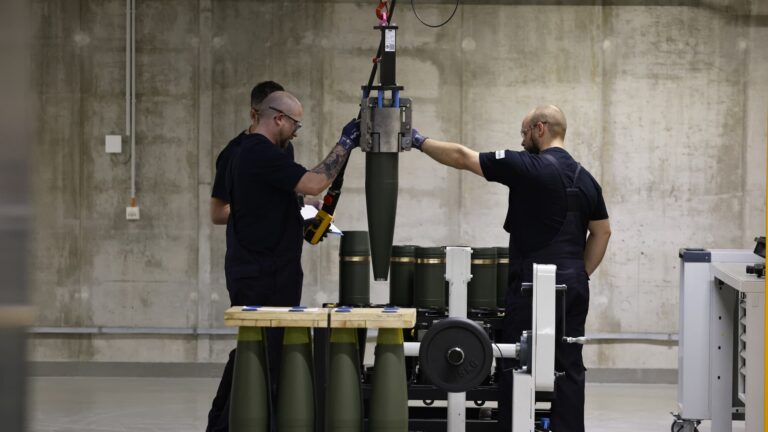Workers are seen at the new Rheinmetall artillery munitions factory during its inauguration on August 27, 2025 in Unterluess, Germany. Germany is investing heavily to modernize the Bundeswehr, its armed forces.
Morris Macmatzen | Getty Images News | Getty Images
Rheinmetall‘s newly-opened factory in Northern Germany — set to become Europe’s biggest ammunition production facility — is another step in the region’s race to catch up with Russian output, according to the company’s chief executive.
CEO Armin Papperger on Wednesday told CNBC that Russia had the capacity to put out 4 to 5 million artillery ammunition rounds a year. Comparatively, he said Europe has a yearly output of around 2 million, more than half of which is produced by Rheinmetall.
The European Union has been supporting Ukraine in its military effort to combat Russia’s invasion, amid uncertainty over the U.S.’ long-term plans to back Kyiv.
Europe’s “biggest need is artillery ammunition and missiles,” Papperger said, stressing the new plant in Unterluess will focus on both items. The plant’s output is expected to reach 350,000 artillery shells a year by 2027.
“We do our utmost, we do whatever we can do to be fast. I had a chat before with [German Defense Minister Boris] Boris Pistorius about that, he said, hurry up. We have to do more,” Papperger told CNBC’s Annette Weisbach.

Along with other European countries and NATO members, Germany has pledged to ramp up defense spending and expand its military in the coming decade — in Berlin’s case, enabled by reforms earlier this year to its debt rules. It has specifically committed to more than double its defense spending to 153 billion euros ($178 billion) by 2029. Some analysts say Germany has more fiscal headroom to deliver on those promises than do the governments of France, Italy and the U.K.
Papperger told CNBC he expected new contracts to come in over the fourth quarter this year and throughout the first quarter of 2026, and that it had received down payments from the government enabling it to make new investments.
“The German government is very fair to us,” he said.

Speaking at the plant’s opening on Wednesday, NATO Secretary General Mark Rutte said the factory was set up by Rheinmetall in a “staggering” timeframe of 14 months.
“This is exactly what we need to ensure the prosperity and security of our economies and societies across Europe and North America, especially at a time when we are aggressively being challenged,” Rutte said.
The NATO chief added that Russia and China were “producing weapons and heavy military equipment at an incredible rate” and with “little transparency.”
“Now we need to see similar efforts to increase the production of more complex capabilities, like tanks and air defense systems and missiles,” Rutte said.

